Project ACE strengthens local capacities and awareness to reduce Child Labor and Exploitation of Children
OFFICIAL RELEASE: Committed to stop child labor and exploitation against children, international child-focused agency World Vision, through its Project Against Child Exploitation (ACE), intensifies its programs aimed to reduce the worst forms of child labor (WFCL), including online sexual exploitation of children (OSEC), and violation of acceptable conditions of work (VACW) in the Philippines.
World Vision’s Project ACE, funded by the United State Department of Labor and launched in October 2019, currently implements the massive initiative in two of the countries’ largest cities Cagayan de Oro City and Quezon City.
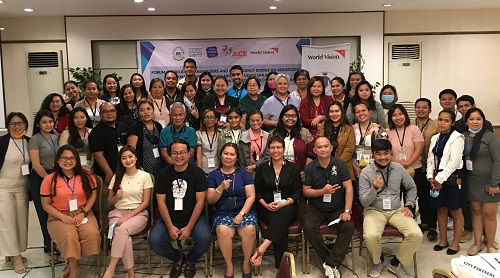
In Cagayan de Oro City, various stakeholders and local partners converged and held a forum last April 2022 to address WFCL, including OSEC in the city. Project ACE partners with the barangay local government units of Cugman, Gusa, and Puntod, communities, and government agencies in Cagayan de Oro City to build the capacities of barangay officials, law enforcers, the members of the Barangay Councils for the Protection of Children (BCPCs), and government agencies in improving service delivery for WFCL prevention and response, specifically in addressing OSEC in the region. During the forum, it was also noted that established reporting and referral mechanisms are also key, but several stakeholders still acknowledge the gaps in the harmonization of plans, programs, and activities addressing WFCL in the city.
“The prevailing issue on child labor and exploitation was given more attention it deserves when Project ACE came in. It didn’t stop with just the data gathering phase in identifying who the victims are and how many are there, but importantly, what services do they need and assistance they can avail,” said Chesca Gabuli, a representative from the City Social Welfare and Development (CSWD) who affirms the project’s initiative and emphasized the strengthening of psychosocial interventions and support to affected children and their families.
Chesca underscored the important role of the government and the local communities in strictly enforcing the provisions stipulated in City Ordinance No. 13195-2017 or the “Parental Responsibility Code of Cagayan de Oro City. Under the city code, children are expected to “enjoy special protection and be given opportunities and facilities, by law and other means, to ensure and enable the fullest physical, mental, emotional, moral, spiritual development in a healthy and normal manner and in conditions of freedom and dignity” that are appropriate to the corresponding developmental stage.
Chesca also mentioned the need to further capacitate barangays in identifying and initial response to alleged cases citing that they are the ones on the ground. According to her, the CSWD is dealing more on the response side, after alleged cases have been referred to them, so they really need more support in the awareness-raising and preventive part. Barangays should also do the initial assessment, including the profiling and evaluation, and when conducting conduct of house-to-house visits for data gathering, including the labor or occupation of every person in the house in their profiling tool.
Jonah Domingo, Cagayan de Oro City Council for the Protection of Children (CCPC) vice-chair, emphasizes the need for a standardized definition of child labor and child work, as well as a more accurate method of profiling child laborers in the city. According to him, the recent appointment of Project ACE Director to the National Council Against Child Labor (NCACL) is crucial in this endeavor. Domingo also directs Gugma sa Kabataan Inc., a partner non-government organization that provides a temporary place for street children where they can be safe and be respected as a person.
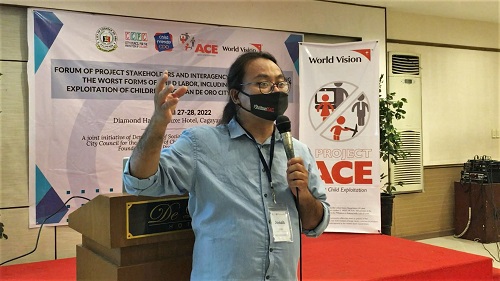
“We are very hopeful that the Project can help mobilize relevant offices and institutions in this advocacy against WFCL, particularly OSEC, given the increasing number of children being exposed to the use of the internet nowadays,” said Domingo. He also noted that some parents are unable to track or monitor their children’s online activity because of work or because of a lack of know-how in using gadgets
The alarming concern of OSEC in the Philippines is partly attributed to the increased internet access and screen time of young people due to the ongoing COVID-19 pandemic. This places more children at risk for online sexual abuse and exploitation as more families resort to easier forms of earning money online to survive. While some parents and guardians claim to be aware of the dangers of staying longer hours online, a majority of others remain unaware of the long term negative effect on children’s mental health and psychosocial well-being.
Role of other institutions is critical
Schools and educational institutions also play a crucial role in identifying red flags and ensuring that children are not engaged in WFCL, including OSEC. These issues may be included in the schools’ curriculum on laws protecting children.
The role of each Barangay Council for the Protection of Children (BCPC) focal is also critical especially in the facilitation of targeted programs and activities in the community, particularly for parents and their children. These include information campaigns through seminars, fora, house-to-house visits, and dissemination of IEC materials physically and through social media.
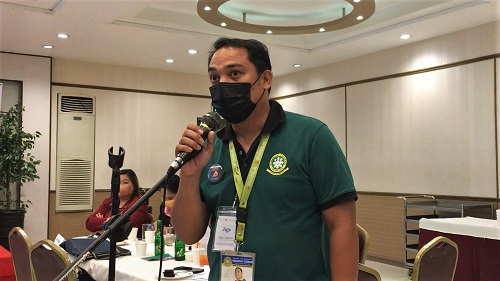
“Before our partnership with project ACE, I noticed that most of us, not only in the barangay but the entire city, accepted child labor as part of the normal. That it was okay for children to be out there to work because it’s the only way they can help their families survive poverty. But if we work closely with the other sectors of society, we can help our children have a better future ahead of them and keep them from engaging in child labor at a very young age,” Jigs Normal Neri, BCPC Focal of Barangay Cugman said.
Jigs added that their participation to Project ACE-initiated seminars and trainings not only served as an eye-opener, but it also fueled them to combat WFCL even with the limited resources they have at their level. Their barangay has crafted an ordinance “Providing for the Elimination of the Worst Forms of Child Labor and Affording Stronger Protection for Working Child Against Abuse, Exploitation, and Discrimination” in the entire barangay which is now in its third reading and awaiting final approval.
From the perspective of law enforcement. PMAJ Noemi Caudilla, Officer-In-Charge of the Cagayan de Oro City Police Office (COCPO) Women and Children Protection Desk, the link between the stakeholders and the business sector is often overlooked. Trainings for business owners and their employees shall be held correspondingly, alongside regular inspections of the establishment. The responsibility not only falls on the parents, barangays, schools, and the city government but on business owners as well. Most of the reported cases of trafficking and sexual abuse are happening in hotels, inns, and other similar establishments that law enforcement officers are struggling to investigate in because of issues on privacy and security.
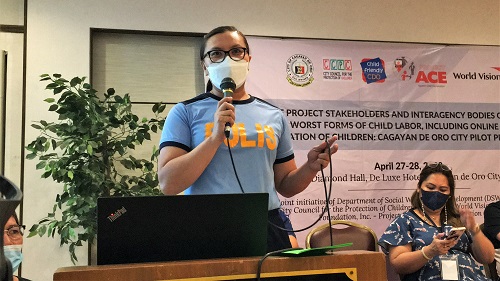
“We are happy to see changes in the coordination process because events conducted by World Vision’s Project ACE serve as an avenue for us to convene. We want to remove children from that situation that’s why we’re doing the best we can to quickly respond to complaints being referred to us. We need stronger coordination between stakeholders, and a whole-of-society approach for greater impact,” PMAJ Caudilla highlighted.
Engaging family members is key
From interviews conducted, family members reveal that the most common work their children do are assisting their parents at work like construction, farming, selling, and garbage disposal.
Eddie Non, 48, shared that his 17-year-old son only works with him during idle hours. His son assists him during construction work—getting him the tools he needs and running errands for him. His services are priced through a by-the-job method common for Filipino handymen called “Pakyawan”, where a handyman, contractor, or construction worker would quote a fixed pay rate to complete the job needed by the client. He said that letting his son join him for work and do simple tasks will equip him for the future. Also, it’s his way of training his son to earn money through work. After all, he said he is more comfortable seeing his son do child work with him rather than staying at home and becoming engaged in destructive habits.
Eddie would rather give some amount to his son for the work he did with him than hire other people since it’s more cost-and labor-efficient if he and his son do the work, especially if the project does not require labor-intensive work.
If the work involves carrying heavy equipment and other tools, he’ll ask someone else to help and just let his son see how things are done.
“I know how important education is for my son’s future, that’s why I’m not letting work interrupt his studies. But I want to show him that earning money is not as easy as it seems, so he’ll be ready because he already has the experience,” Eddie shared. His son, he said, is in favor of their current setup because he can save the money and buy things he wants but his parents can afford to buy for him and his other siblings.
Eddie’s father is just one of the many who believe that it’s important that children get exposed to working at an early age because they feel that their children’s lives will get harder than what it already is when they grow up. However, there are other ways that parents can earn enough money for their families without letting their children do work and we need the government and other institutions to help us with that.
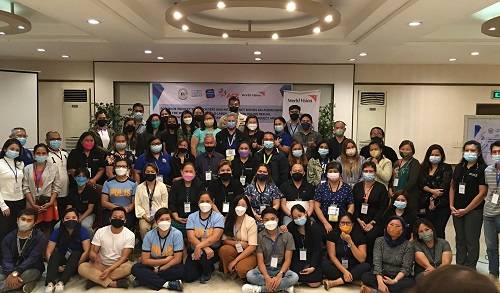
Project ACE and its like-minded partners envision communities where no children will be deprived of their basic rights and well-being including their education, to be free from any form of hazardous work and exploitation, and to enjoy their childhood and live life to the fullest.
Leave no children behind. Together, let us stand and be against child exploitation.
Project ACE is funded by the United States Department of Labor (US-DOL) under cooperative agreement number IL 34007-19-75-K. 100 percent of the total costs of the project in the Philippines is financed with federal funds.








